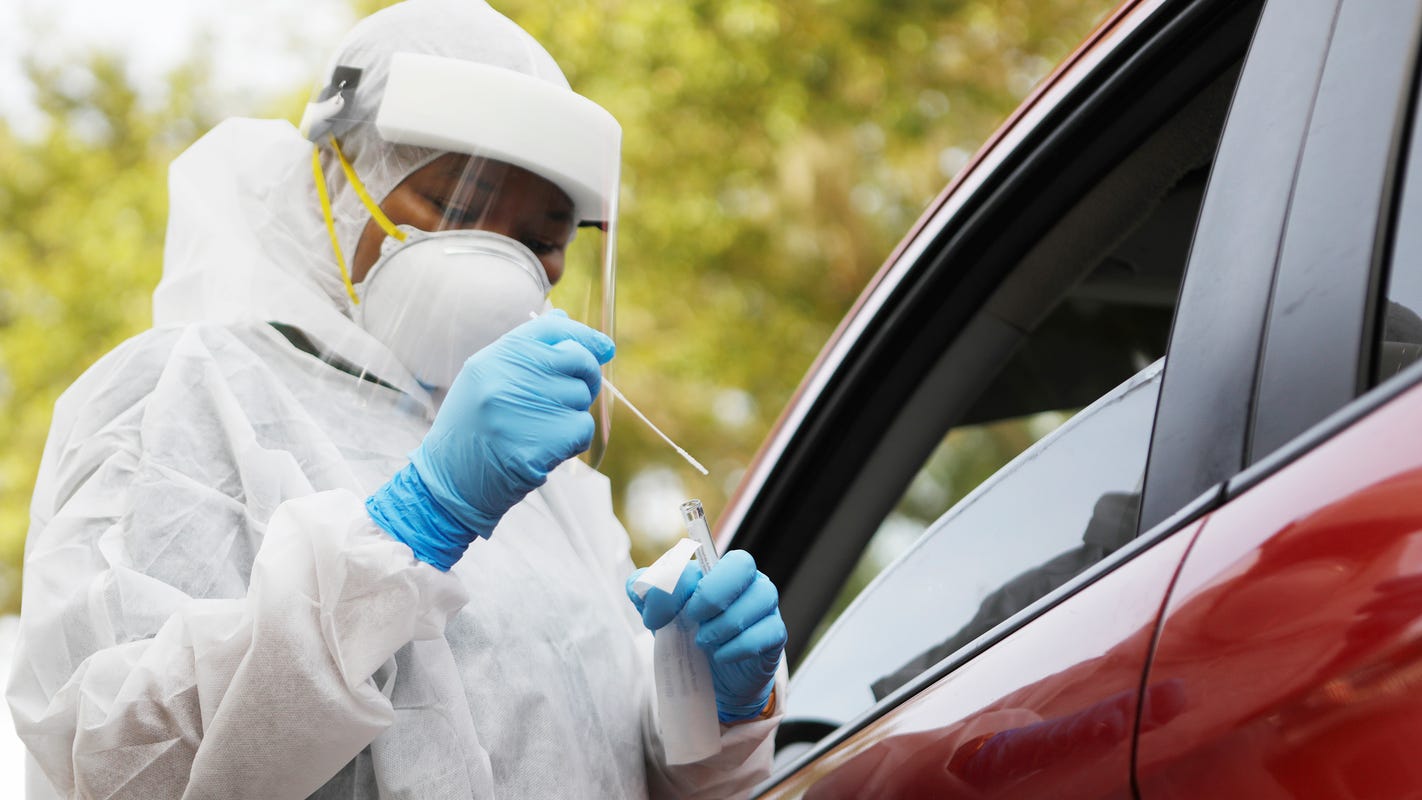Dr. Anthony Fauci, the nation’s leading infectious disease expert, told the Washington Post that officials are talking about implementing a new strategy that tests groups of people together.
It’s known as pool testing, where samples from multiple people are combined and tested as a group.
Dr. Deborah Birx, coordinator for the White House’s coronavirus task force, said this week that “pooling would give us the capacity to go from a half a million tests a day to potentially 5 million individuals tested per day,” according to health news site STAT.
Before the coronavirus pandemic, pool testing was only used in the world of blood banking. So, how will officials use it for SARS-CoV-2?
How does pool testing work?
Pool testing is when samples from several individuals are tested together in a single tube using sensitive molecular biological detection methods to get a single test result. In this example 100 individuals are tested in groups of five.
If it comes back negative, researchers can move on knowing that entire group is negative for the coronavirus. However, if the results come back positive, each individual would have to be retested with standard coronavirus diagnostic testing.
“What you need to do is find the penetration of infected people in your society,” Fauci told the Washington Post. “And the only way you know that is by casting a broad net.”
Michael Mina, assistant professor of epidemiology at the Harvard T.H. Chan School of Public Health, said pool testing has the potential to increase the number of people tested tenfold, “if not 100-fold.”
While the test doesn’t verify if a person has the coronavirus the way a diagnostic test does, pool testing helps identify people who are asymptomatic,STAT reports.
Dr. Anthony Fauci told a House panel he’d never been instructed to slow down coronavirus testing, despite recent claims from President Trump.
What are the drawbacks of pool testing?
An obvious disadvantage of pool testing is when the test result comes back positive. In this case, all the samples must be retested individually as the people who were sampled quarantine at home awaiting their results.
“It could be a very anxiety provoking effort if there’s a long duration of time between telling somebody that the pool was positive to getting them their individual results,” Mina said.
Brian Rubin, chairman of pathology at the Cleveland Clinic, says that test sensitivity could be compromised when adding more samples to a pool. The more samples that are added to the pool, the more diluted they become, which makes it harder for the test to detect viral RNA if there’s a person in the pool who has the virus.
Patients who are in the early stages of the infection have a relatively low viral load and the test may fail to detect the coronavirus when there are other samples in the pool drowning it out, resulting in a negative result.
The coronavirus has tentacles now?: Startling images reveal coronavirus forming tentacles in cells. It may help identify new treatments.
‘Why representation matters’: U.S. doctor shortage worsens as efforts to recruit Black and Latino students stall
“That’s going to be the infectious patient that’s going to infect a lot of people,” Rubin said. “That’s definitely the guy you don’t want to miss.”
But false negatives are possible with any polymerase chain reaction test, even with only one sample, he added. This is why he urges doctors to retest when there’s any clinical suspicion of COVID-19, even if the patient tested negative the first time.
Who should get it?
Rubin says pool testing can be very beneficial, but it depends on the population. Pool testing makes sense on a group of health factory workers who aren’t likely to test positive and, if they do, are able to quarantine safely at home. But it makes less sense at a nursing home where one positive could risk residents’ lives.
“You got the think about the patient population,” he said. “What’s a miss going to mean clinically for a group?”
The Cleveland Clinic has already validated pool testing and Rubin has confirmed the lab has tested at most two samples at a time. He said he “highly recommends” pooling, especially if the incidence rate is really low.
“I think we should anticipate seeing pooling become a very important part of the way that we monitor for these viruses in the future,” Mina said.
What about cost?
It would be very cost effective for the CDC to implement pool testing, especially after the agency sent $631 million to state and local health departments in May to increase their capacity to do contact tracing and testing, according to the Washington Post.
Richard Tesoriero, vice president of business and operational performance at Northwell Health Labs, says that lab testing for COVID-19 is fully covered by Medicare, Medicaid, other government plans and most private plans as mandated by law.
Marketplace price of a test ranges from $50 to $200. If public and private labs are now performing more than 400,000 tests most days – a figure the U.S. Department of Health and Human Services projects will more than double by late summer – Mina says “that can become extraordinarily expensive.”
“I think that the question of pooling is now arising because people are figuring out how are we going to test this many people and not drive ourselves in the ground financially,” he said.
Who else is doing it?
A team at Saarland University Hospital in Homburg, Germany has been pool testing since mid-March to protect vulnerable patients from infection by asymptomatic carriers, according to a press release. Previous studies have suggested a person can be most infectious days before showing any symptoms.
Its success led to using the new method to screen residents and staff at nursing and residential care homes in Saarland.
‘Something’s not working,’ Fauci says
Fauci’s announcement that officials are talking about implementing the pool testing strategy comes after he confirmed at the House Energy and Commerce Committee hearing Tuesday that the coronavirus task force was planning to do more testing, not less as President Donald Trump had previously claimed.
“Something’s not working,” he said during the Post interview. “I mean, you can do all the diagramming you want, but something is not working.”
Fauci didn’t elaborate, but many experts recall the testing blunder in March when the Centers for Disease Control and Prevention first rolled out a dysfunctional test, which delayed testing for weeks as the coronavirus continued to spread throughout the country.





… [Trackback]
[…] Find More here on that Topic: famousreporters.com/trump-administration-considering-pool-testing-for-coronavirus-fauci-says-heres-what-that-means/ […]
… [Trackback]
[…] Information to that Topic: famousreporters.com/trump-administration-considering-pool-testing-for-coronavirus-fauci-says-heres-what-that-means/ […]
… [Trackback]
[…] Find More to that Topic: famousreporters.com/trump-administration-considering-pool-testing-for-coronavirus-fauci-says-heres-what-that-means/ […]
… [Trackback]
[…] Here you can find 58335 more Info on that Topic: famousreporters.com/trump-administration-considering-pool-testing-for-coronavirus-fauci-says-heres-what-that-means/ […]
… [Trackback]
[…] Here you will find 16749 additional Info to that Topic: famousreporters.com/trump-administration-considering-pool-testing-for-coronavirus-fauci-says-heres-what-that-means/ […]
… [Trackback]
[…] Read More Info here to that Topic: famousreporters.com/trump-administration-considering-pool-testing-for-coronavirus-fauci-says-heres-what-that-means/ […]
… [Trackback]
[…] Read More Info here on that Topic: famousreporters.com/trump-administration-considering-pool-testing-for-coronavirus-fauci-says-heres-what-that-means/ […]
… [Trackback]
[…] There you will find 3104 additional Info on that Topic: famousreporters.com/trump-administration-considering-pool-testing-for-coronavirus-fauci-says-heres-what-that-means/ […]